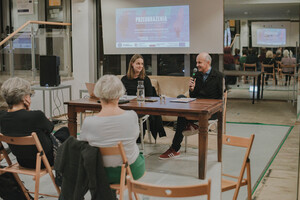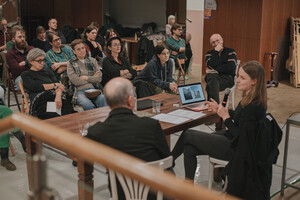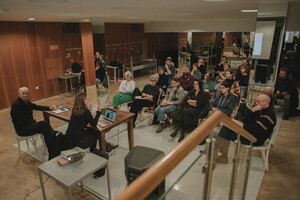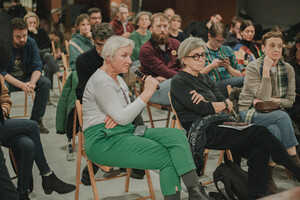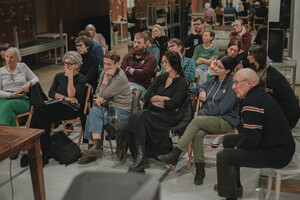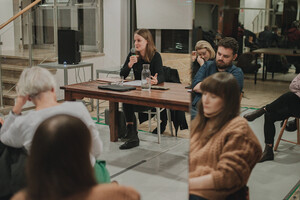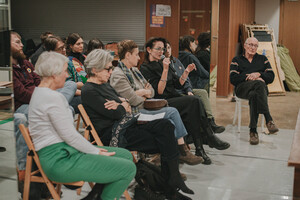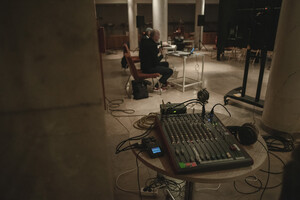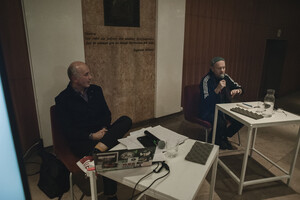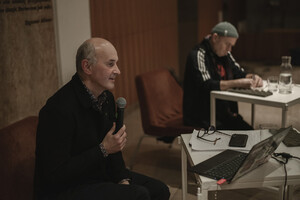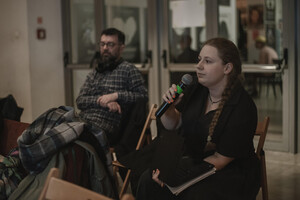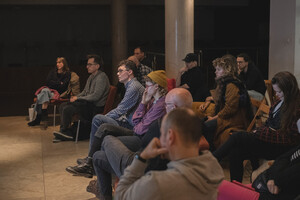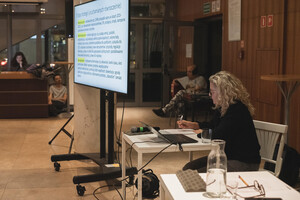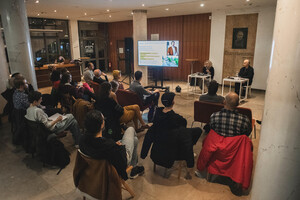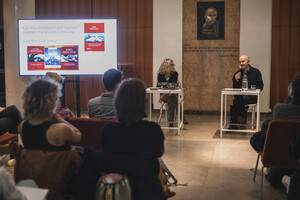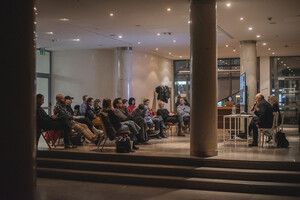Leader
Przemysław Wielgosz - journalist, publisher and curator. Editor-in-chief of the Polish edition of "Le Monde diplomatique" and book series: Library of "Le Monde diplomatique" and Library of Economic Alternatives. In the RM publishing house he is the content editor of the series People's History of Poland. He has published in Wiadomości Kulturalne, Trybuna, Przekrój, Pismo, Guardian, Aspen Review and Freitag, among others. Among others, he is the author of the books Opium of Globalisation (2004), Welcome to Harder Times (2020) and Games of Race. How Capitalism Divides to Rule (2021), nominated for the 2022 Nike Literary Award; editor and co-author of the books The End of Europe as We Know It (2013), TTIP - The Transatlantic Trap (2015), The Dictatorship of Debt (2016), Real Capitalism. Around the Theory of Monopoly Capital (2018), Pandemic of Capitalism (2021), Economies of the Future (2021). In 2022, he curated the series Economies of the Future at Biennale Warsaw, People's History of Poland at Strefa WolnoSłowa and Stories of People without History at the Eighth Day Theatre.
Programme
01. The kingdom of anarchy
Guest of the meeting:
Michał Pospiszyl
After a century of wars, epidemics, and natural disasters, at the beginning of the 18th century, Poland was a nearly collapsed state. Continuous internal conflicts, a lack of strong administration, a permanent army, and effective border control contributed to the image of the Polish-Lithuanian Commonwealth as a "kingdom of anarchy." While the traditional historical narrative has equated the state's collapse with a social catastrophe, numerous sources suggest that the situation, if not entirely the opposite, was at least more complex. The absence of centralized repressive apparatus meant that there was virtually no control over population flows, and 18th-century Poland (with its untapped natural resources) became an attractive place for hundreds of thousands of peasants, Jews, Mennonites, and Old Believers fleeing from Russia, Prussia, Austria, or Turkey.
Michał Pospiszyl – historian, assistant professor at the Institute of Political Studies at the Polish Academy of Sciences (PAN). Author or co-author of three books, including Rozkład. Esej o związkach państwa i patogenów (Decay: An Essay on the State and Pathogens, PWN 2021). He was a fellow at the International Institute for Advanced Study (IWM) in 2020/21 and a finalist for the Barbara Skarga Award in 2021. He is currently preparing a book on the social and environmental history of Eastern European wetlands (to be published by Czarne). He lives in the Białowieża Forest.
02. Climate, pestilence and the power of the subjugated
Guest of the meeting:
Michał Rauszer
Nearly 700 years ago, the European world stood on the brink of destruction. A cooling climate contributed to economic collapse, famine, and a surge in conflicts over dwindling resources. At the same time, an unprecedented epidemic of the Black Death swept across the continent, killing nearly a third of the population. In response to this series of environmental catastrophes, a powerful wave of social rebellions erupted. From the Ciompi revolt in Florence to the peasant Jacquerie in France, and the popular wars in England (Wat Tyler's Rebellion) and Bohemia (Hussite Revolution), successive blows shattered the old feudal order. The extreme environmental crisis, combined with the radical rise in power of the subjugated classes, led to one of the most significant revolutions of our era.
As a result of the extraordinary alliance between the destructive forces of nature and the emancipatory aspirations of the plebeian classes, the world not only avoided destruction but, in many respects, became a better place. The economic situation and political position of the European poor improved for almost 200 years. Can the history of the 14th-century revolutions be of use to us in the face of global warming and pandemics? Can we call it a distant mirror of contemporary times, as American historian Barbara W. Tuchman did? And if so, what do we see in that mirror?
Dr. hab. Michał Rauszer – anthropologist, lecturer at the University of Warsaw, author of the books Bękarty pańszczyzny (Bastards of Serfdom, 2020), Siła podporządkowanych (The Power of the Subjugated, 2021), and Ludowy antyklerykalizm (Popular Anti-Clericalism, 2023).
03. Climate and Cannibals: Colonizers discover America
Guest of the meeting:
Dr. Iwona Krupecka
From the moment the first European set foot on a piece of land in the "New World," descriptions began to multiply: of animals, plants, people, terrain, and natural phenomena. These descriptions, often framed within the category of "climate," were not merely factual accounts. Behind the seemingly objective categories of climate—hot, cold, or temperate—lay anthropological theses, and their consequence was the alleged "natural" domination of the European over the people of hot or cold climates. The lushness of the American wilderness, the differences in species, or the "astonishing" landforms could be interpreted either as a positive sign (a young, new, fertile world) or a negative one (any excess as a transgression of norms). In Renaissance climate theory, there is no neutral description: the puma is not simply a puma, but a non-lion; on the paradisiacal beaches, natural cannibals roam, and tropical America is, of course, naked.
Dr. Iwona Krupecka, philosopher and historian of philosophy, assistant professor at the Institute of Philosophy, University of Gdańsk, author of the book Descartes and the Cannibals (2021).
04. A world of planetary solidarity? The global environmental crisis from a socialist perspective
Guest of the meeting:
Dr. Weronika Parafianowicz
In 1969, UN Secretary-General U Thant presented a report that began with the words: "For the first time in human history, we are facing a crisis on a global scale – the crisis of the environment that sustains human life." The turning point of the 1960s and 1970s marked a growing awareness that ecological problems, caused by human activity, were of a global nature, threatening Earth's ecosystems and, as a result, the human species. Publications like Silent Spring and The Limits to Growth demonstrated how industrial production and increasingly industrialized agriculture were burdening the environment, often leading to irreversible damage and the depletion of non-renewable resources. This period also saw the emergence of the first mass ecological movements, and environmental protection issues began to be viewed increasingly as a political challenge. In 1972, the UN Conference in Stockholm was organized under the significant slogan "We have only one Earth."
Many ecological problems were seen as a direct consequence of the capitalist system, based on ever-increasing production and consumption, which wastefully exploited non-renewable resources and other Earth resources while generating massive amounts of waste. As German researchers Ulrich Brand and Markus Wissen point out, the crisis of the early 1970s "opened a window of opportunity" to radically change the hegemonic political-economic system.
From the perspective of many on the left, this crisis was seen as an opportunity to globalize socialism. During the lecture, we will examine proposals for a model of socialism that combines the fight for social justice with ecological demands. We will listen to voices from socialist states in Central and Eastern Europe, as well as from leftist thinkers and politicians in Western Europe and activists and scholars from the Global South. We will also discuss the ecological crisis experienced by socialist states and the reasons why the "window of opportunity" mentioned by Brand and Wissen closed so quickly. We will also explore the threads of socialist thought from the 1970s that remain relevant today and could serve as an inspiration for the fight against the contemporary social and ecological crisis.
Dr. Weronika Parafianowicz is a member of the Department of Cultural History at the Institute of Art History, University of Warsaw. She works on housing, the history of modern Czech culture, and Central European issues, as well as the idea of post-growth and the ecological threads in socialist thought.
05. Cartographies of violence. Actions against humans and non-humans in the Gaza Strip
Guest of the meeting:
Dr. Maria Wodzińska
In his famous 2010 essay Necropolitics, Achille Mbembe posed the question: "What is the relationship between politics and death in systems that can only function under a state of emergency?" The essay raises the issue of whether and how actions that do not directly concern only humans can be incorporated into reflections on the relationship between politics and death. The Gaza Strip is, in this context, an emblematic example. It is a precisely demarcated space, enclosed by walls and barriers, surrounded by military infrastructure, with a system of checkpoints and border crossings leading into it. It is also a place where there is constant control over bodies, carried out on all possible levels and by nearly all actors present – the military, other state services, and the ubiquitous infrastructure, border technologies, and military technologies designed for surveillance and constant monitoring. However, crucially, the Gaza Strip is subjected to unrelenting "falling-from-the-sky" violence. We encounter missiles, falling from above, that target specific points, bringing death to humans, as well as herbicide sprays, also dispersed from the air, that bring death to non-humans.
Dr. Maria Wodzińska – PhD in humanities, independent researcher.
06. The global core of darkness. Colonialism, famine and the birth of modernity
Guest of the meeting:
Przemysław Wielgosz
Moderator:
Roman Kurkiewicz
Could it be that the climate crisis and colonialism during the British hegemonic era under Queen Victoria helped create the modern world? Their intersection undoubtedly lies behind the division of the planet into the impoverished South and the wealthy North. This is clear to see "with the naked eye." Wherever the power of Western empires reached, postcolonial societies continue to grapple not only with poverty but also with ecological catastrophe. It is striking that today, climate change is driving millions of people from their homes, particularly from countries that were once jewels in the crowns of European monarchies. Does this mean we are still stuck in the late Victorian era?
In his pioneering book Late Victorian Holocausts, American geographer and historian Mike Davis seeks to answer the question of how countries like India and China, which at the end of the 18th century surpassed Europe in terms of economic development and quality of life, were relegated to the peripheries of the world. According to Davis, the roots of modern inequality can be traced to the confluence, in the second half of the 19th century, of Western military dominance, the imposition by the British Empire of liberal-Malthusian ideology, protectionist economic practices, and the climate crisis linked to the intensification of El Niño (South Pacific oscillations). The consequence of these processes was a series of famines that engulfed the world in the final three decades of the 19th century, claiming about 60 million lives. This disaster was not just an episode in the history of one century. A blend of colonialism, capitalism, and ideological arrogance created one of the most genocidal systems in human history, a system that continues to exist and operate to this day. Does this mean that the late Victorian holocaust could repeat itself? What connects modern capitalism and the climate crisis? Why did precolonial societies cope with cyclical droughts? Is decolonization the key to alleviating the effects of environmental crises?
07. Beyond growth. And back into the forest
Guest of the meeting:
Maciej Grodzicki
At the root of capitalism lies the separation of two spheres: mind and matter, (some) humans and nature. Enclosure and primitive accumulation detached communities from the land that was the basis of their survival, while nature was reduced to a resource working for capital. Forests, which had previously met the needs of local communities, became sources of timber and objects of cultivation according to industrial logic. Today, we experience the delayed effects of this separation, both on a global scale and locally, in the form of rising costs of intensive forestry practices. Proposals for forest nature protection, which typically focus on creating networks of protected areas, often do not address this dualism or challenge the principles of capital accumulation. There is also "degrowth," an idea of moving beyond capitalism and its expansionist tendencies—but with the breaking of the dualism and the acceptance of our material interdependence with nature, including forests. Although often considered naïve or utopian, degrowth already exists today. Forest communities, local rural protests against industrial farms, the reviving cooperative movement, and the so-called ecology of everyday life—these are already active examples of economies based on genuine being-in-nature and values of moderation, care for common resources, and social justice. During this meeting, we will discuss the conditions for their wider adoption, in contrast to the hegemonic logic of capital.
Dr. Maciej Grodzicki – economist, assistant professor at the Jagiellonian University, member of the Climate Council at the Jagiellonian University and the board of the Polish Network for Economics, as well as an activist with the Nationwide Trade Union "Inicjatywa Pracownicza" (Workers' Initiative). His research focuses on international political economy, global supply chains, and the economics of common resources, including forests.
08. Another Anthropocene possible? The socialisation of the human epoch
Guest of the meeting:
Prof. Dr. Hab. Ewa Bińczyk (Institute of Philosophy, Nicolaus Copernicus University)
In the discussion on the planetary environmental crisis and the Anthropocene, images of the darkest disaster scenarios are already gradually being articulated. Scientists are drawing a picture of a world of unprecedented difficulties: disappearance of ecological niches for the survival of the homo sapiens species, extinction or decimation of species, loss of fertile soils and access to drinking water, migration and populism.
But can we stop at such dark impulses to remodel our imagination? Against the trends described, and with references to the most promising approaches of ecological economics, we will nevertheless try to wrestle with optimism. During the lecture, we presented the boundary conditions for the remodelling of the socio-political imagination in the human age. These are as follows:
- The need for real alternatives: something fundamentally different from the "business as usual" of fossil fuel capitalism.
- Ex-centricity.
- Specificity: saturation with illustrations, examples to follow, and fulfilling the sensory dimension of imagination.
- Deconstructing the illusions of the free-market and pro-growth optics, moving beyond wishful thinking.
- Respect for infrastructures in the project of socializing decarbonization.
Colophon
The meetings and podcasts from the series "Transformations. The unnatural history of environmental crises" were financed by the European Union NextGenerationEU

The meetings are held as part of the Re-think the challenge project financed by the Allianz Foundation.

